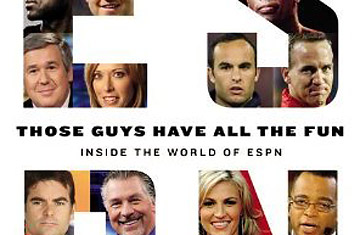
(2 of 2)
Nevertheless, ESPN clawed its way into viability and even journalistic respectability. (The Rasmussens were one of the casualties — they were tossed out in 1980 with a chunk of equity to keep them happy.) One of the major figures behind the scenes is John Walsh, a stranger-than-fiction character — he's not only an albino but also legally blind, a rarity among television pioneers — who is largely responsible for transforming SportsCenter into the success that it is. He frequently clashed with the on-air talent, most notably the unstoppable duo of Dan Patrick and Keith Olbermann. Referring to SportsCenter as "the Big Show" was a Patrick/Olbermann inside joke: it had to do with the grind of doing hour-long episodes. When Walsh ordered them to cut it out, Olbermann switched to repeating the sentence "This is SportsCenter" over and over again, as many times as he could get it into an episode, because of its sheer dullness. An act of rebellion, it caught on as marketing. In fact, as Olbermann points out, "both catchphrases ... worked, and both made them millions." (Olbermann always comes off as charming and hyperarticulate in his quotes, but not everybody was charmed by him, and apparently he could be prickly behind the scenes. "We felt not so much relief when Keith left as unrestrained f---ing joy," says fellow anchor Bob Ley. "People were thrilled.")
ESPN does highlights. Miller and Shales do lowlights, and they're good at zeroing in on a debacle and getting everybody involved to weigh in, even if it's just to throw blame at everybody else. When the rebarbative interviewer Jim Rome taunted NFL quarterback Jim Everett by calling him "Chris Evert" on air, to his face, Everett got out of his chair, and Rome ended up on the floor. "The whole thing unraveled on me," Rome says now. "That was not a good thing." (Walsh calls it "a complete embarrassment. Exactly what I was worried about with this guy." This guy meaning Rome, not Everett.) Rush Limbaugh weighs in on his brief tenure on NFL Countdown, which ended after he made an inflammatory remark about Eagles quarterback Donovan McNabb. (After the show was taped, Limbaugh says, "Nobody even said a word ... Everybody thought it was a good show. When they did a postmortem, my comment didn't even come up.")
Nobody has it tougher than the women trying to clear a path through the unreconstructedly male jungle of professional sports in general and ESPN in particular. Karie Ross, an early anchor, describes mail staffers flipping on the Playboy Channel just to watch her reaction; she wound up making a speech about sexual harassment in the cafeteria. Julie Anderson recalls getting hit on by Mike Tyson during his rape trial ("It was crazy, it was insane, it was scary"). An inebriated Joe Namath famously asked Suzy Kolber, "Can I kiss you?," on air on the sidelines of a freezing-cold Jets game. (He later apologized.) And popular culture suffered a permanent loss when management quashed Linda Cohn's baseball-highlights catchphrase after just one usage: "master batter." (If you ever wonder how the SportsCenter catchphrase "salsa" came about, it happened because anchor Brett Haber bet Craig Kilborn they could make up a totally meaningless catchphrase, and it would still catch on. They were eating Mexican food at the time.)
There are plenty more debacles where those came from, like the ESPN phone and the LeBron James "Decision" special. The first X Games in 1995 was apparently a mess behind the scenes — there was a culture clash between corporate television and the alternative athletes whom ESPN was trying to make into stars. ("For the skating and bike events, the judges were kids or adults who never grew up and were stoned the entire time," says one producer. "They had never even used any type of electronic equipment and were either too stoned or not inclined to figure it out.") But credit where credit is due, what you see in Those Guys Have All the Fun is people making something out of nothing. March Madness barely existed before ESPN signed a deal with the NCAA to broadcast the early rounds of its basketball tournament. ESPN turned NASCAR from a cult phenomenon into a national obsession. (Australian rules football is still waiting for its moment.)
By the end of the book (at 763 pages, it could have been tighter), you're amazed at the disconnect between the chaos behind the scenes and the relatively slick end product. It was amateur hour all the time, but the product somehow remained professional. There's something definitive about this anecdote: in 1987, ESPN had no deal with the NFL, so after the Super Bowl, Chris "Boomer" Berman, the network's first on-air superstar, had to do the highlights remotely from a truck parked outside the Rose Bowl in Pasadena, Calif. Naturally, the video feed to the truck went down, and Berman couldn't see the highlights he was calling. He went ahead and did them anyway, even though he was working blind — off the cuff and from memory. And he nailed them, because he knew the game that well, and because he had to. Nobody sitting at home would ever know the difference — until now.
